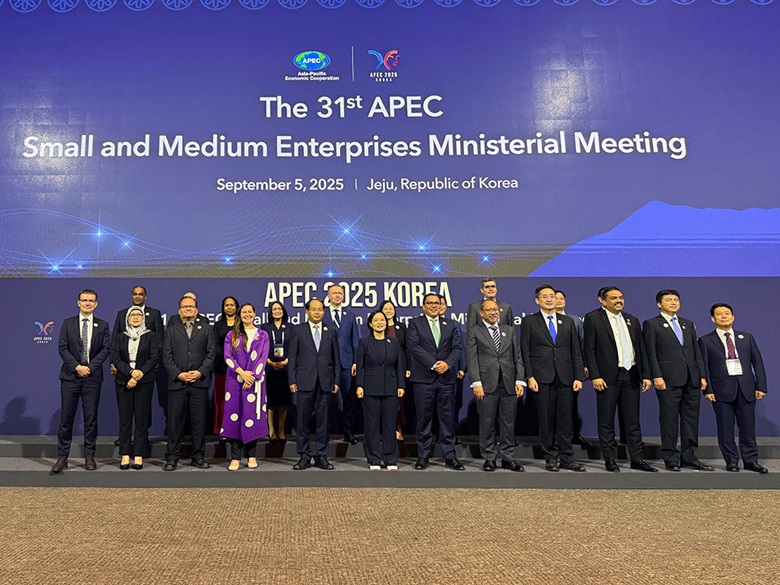2025 APEC Small and Medium Enterprises Ministerial Meeting

Joint Statement on the 31st APEC Small and Medium Enterprises Ministerial Meeting
Jeju, Republic of Korea
5 September 2025
1. We, the Asia-Pacific Economic Cooperation (APEC) Ministers responsible for Small and Medium Enterprises (SMEs), met in Jeju, Republic of Korea, on September 5, 2025, chaired by Minister of SMEs and Startups, Republic of Korea. We welcomed the participation of the APEC Business Advisory Council (ABAC).
2. As we mark the 31st anniversary of the first meeting in 1994 with strong commitment among member economies since then, we reiterate our commitment to achieve the APEC Putrajaya Vision 2040, including through the implementation of the Aotearoa Plan of Action to realize an open, dynamic, resilient and peaceful Asia-Pacific community for the prosperity of all our people and future generations. We emphasize how vital this is for MSMEs, which account for 97% of businesses in the APEC region. We note the previous efforts by member economies to foster MSME advancement, such as the Lima Roadmap and the Bangkok Goals. We welcome APEC's efforts to make doing business easier, while fostering, resilient, and innovative MSMEs, including those facing structural barriers to achieve their full economic potential, including in accordance with the La Serena Roadmap for Women and Inclusive Growth.
3. Taking inspiration from the APEC 2025 theme of “Building a Sustainable Tomorrow” and the policy priorities of building a more connected, innovative, and prosperous APEC region, we underscored the importance of creating sustainable economic growth pathways for MSMEs, including adopting emerging technologies, fostering enabling business environments and policy frameworks, and enhancing connectivity. We also note the importance of strengthening participation of MSMEs in the global market.
4. The APEC 2025 SME Ministerial Meeting theme of “MSMEs as Engines of Sustainable and Inclusive Growth” focuses on innovation and connectivity as ways to empower MSMEs. In the spirit of cooperation, APEC economies will continue to share concrete policy experiences, best practices, and innovative approaches that support MSME development.
5. We recognize that the innovation and growth of MSMEs hinges on a favorable business environment including the effective utilization of artificial intelligence (AI) and digital technologies. Sharing information on APEC economies’ support policies for MSMEs in the AI and digital fields, including digital infrastructure and cybersecurity measures, and discussion of best practices for productivity improvement can foster a more conducive environment for innovation and entrepreneurship, enhance digital capabilities, encourage responsible business conduct, and remove regulatory barriers for MSMEs in the APEC region, thereby reducing technological gaps and providing opportunities for growth. We seek to support startups and entrepreneurship and create a business environment that fosters innovation, through mentorship programs, business incubation, and government programs and resources. We also recognize the importance of innovative ecosystems for MSMEs’ development, support voluntary knowledge sharing on a mutually agreed basis and cooperation among economies. We will also continue our cooperation on facilitating the flow of data and strengthening business and consumer trust in digital transactions.
6. We reiterate that the growth, productivity, and competitiveness of MSMEs depends on their response to economic changes. MSMEs’ resiliency will require innovative, tailored, and data-driven policy approaches. We recognize that scientific and technological innovation is creating new momentum for MSMEs’ growth, as well as new opportunities to tackle the challenges confronting MSMEs. We support the development of innovative products and solutions to enhance MSMEs’ digital transformation. We acknowledge that MSMEs can overcome resource limitations and enhance their innovation capabilities by leveraging emerging technologies, such as AI, to foster innovative pathways to support our economies’ development.
7. We recognize the need for enhanced connectivity to facilitate the growth of MSMEs in APEC economies. Considering the limitations faced by MSMEs, we emphasize the importance of enhancing collaboration, including between the public and private sector, and other stakeholders, as appropriate, which can help MSMEs and startups in the region improve their productivity, efficiency, and ability to innovate. We welcome innovative approaches to fostering MSME development through enhancing supply chain networks, promoting collaborative innovation, and establishing connections with large companies to support MSME growth and integration into global markets. We encourage economies to promote financial access for MSMEs including through access to financial services, financial education and the adoption of responsible financial practices. Furthermore, through global collaboration, these partnerships can promote economic growth across the APEC region.
8. Partnerships among innovative MSMEs in the region can be expanded to include a diverse range of stakeholders, making them essential drivers of economic growth. Recognizing the importance of collaborative efforts and connectivity in supporting MSMEs, we welcome the Jeju Initiative, which aims to strengthen connectivity among key stakeholders in innovation and MSME development, such as startups, government bodies, venture capitalists, and business incubators. We encourage cross-border cooperation among startup ecosystems across the APEC region through the exchange of policies, information, experiences, and best practices.
9. We express our gratitude to the Republic of Korea for serving as host to our 31st SME Ministerial Meeting, and we look forward to our next Ministerial Meeting in the People’s Republic of China.

